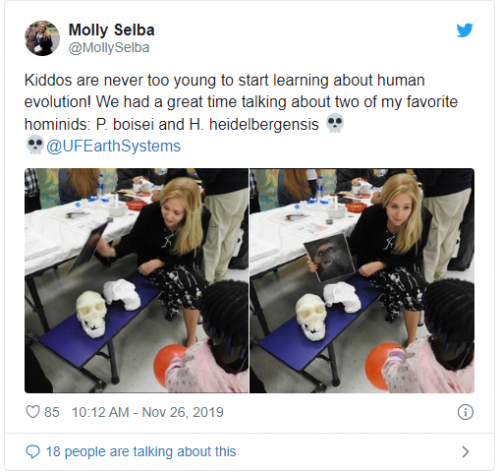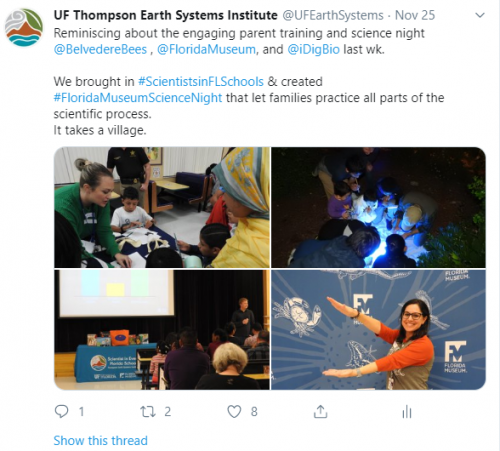It was a tall order…How do you overcome language and cultural barriers in order to teach parents and students the necessary components of the scientific process for a science fair experiment, and do so in a fun and engaging way?
Principal Amy Lopez, assistant principal Hara Klimantiris, and science teacher William Kerr reached out to Scientist in Every Florida School, which connects teachers and scientists across the state, to discuss a bold idea. As a requirement for the School District of Palm Beach County, schools must complete at least three parent training events annually. Belvedere Elementary wanted to host parent training at the school to help families better understand the scientific process; something the school ranked as a top priority for improvement.
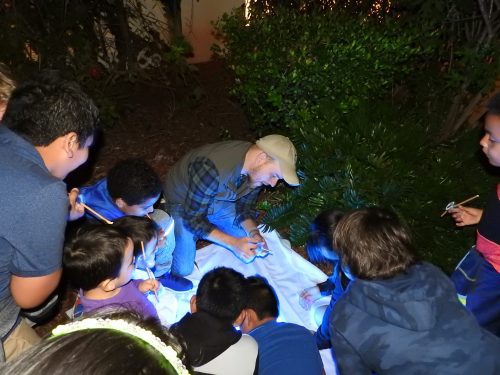
For Belvedere Elementary, the innately confusing paperwork for the science fair continued to pose difficulties for students and staff, since 88% of the school population’s primary language is Spanish. Teachers expressed the need for many students to have access to further help at home, and so planning for a training event and science night began.
SEFS enlisted the help of the Florida Museum as well as iDigBio to participate in executing the Belevedere Elementary Science Night. Together, the group managed to pull off an amazingly successful event.
The following note from a teacher stated, “Excellent job. Thanks for all of your hard work. It was a great success. The kids were so engaged in the experiments and both parents and kids seemed to thoroughly enjoy the night”.
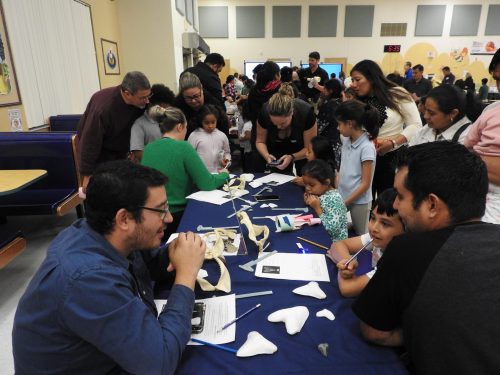
An integral part of that success included a presentation by scientist, Sean Moran, that detailed all aspects of the scientific process. The information was delivered in Spanish by scientist, Alberto Lopez Torres. Careful and deliberate planning of over 12 interactive stations for families to put into practice what they learned during the talk also reinforced key points of the talk.
Each station purposefully highlighted an aspect of the scientific process so that both students and parents had an opportunity to practice. Dual language signage for each station showcased the mission at hand. Crowds of students and parents could be found huddled at each table taking part in the activities throughout the two-hour event.
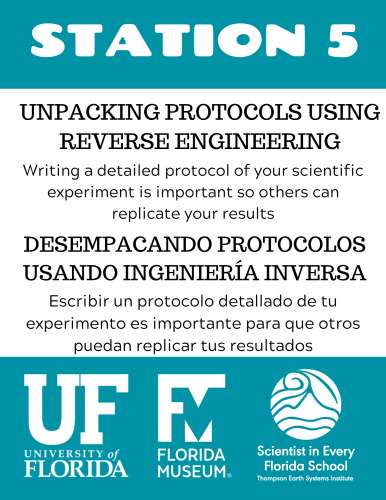
With 15 minutes left for the evening, a loud bell sounded that it was time to “Ask a Scientist”. Seven University of Florida scientists engaged in a question and answer session and then raffled off swag from the Florida Museum.
As one 5th grade student put it, “I thought tonight was really pretty neat. The scientists drove all the way from Gainesville, which I think is pretty far, to support our school”.
FLORIDA STANDARDS COVERED AT THE EVENT
- SC.5.N.1.1 Define a problem, use appropriate reference materials to support scientific understanding, plan and carry out scientific investigations of various types such as systematic observations, experiments requiring the identification of variables, collecting and organizing data, interpreting data in charts, tables, and graphics, analyze information, make predictions, and defend conclusions
- SC.5.N.1.2 Explain the difference between an experiment and other types of scientific investigation
- SC.5.N.1.3 Recognize and explain the need for repeated experimental trials
- SC.5.N.1.4 Identify a control group and explain its importance in an experiment
- SC.5.N.15 Recognize and explain that authentic scientific investigation frequently does not parallel the steps of “the scientific method”
- SC.5.N.1.6 Recognize and explain the difference between personal opinion/interpretation and verified observation
- SC.5.N.2.1 Recognize and explain that science is grounded in empirical observations that are testable; explanation must always be linked with evidence
- SC.5.N.2.2 Recognize and explain that when scientific investigations are carried out, the evidence produced by those investigations should be replicable by others
For more information on how Scientist in Every Florida School can deliver dynamic and innovating ways to target Florida standards, schedule your scientist today: Request a Scientist Form.
